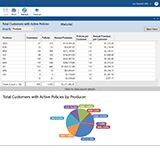In response to stubbornly high inflation in the U.S., the Federal Reserve has begun raising the interest rates that it controls. In June 2022 alone, the Fed increased its benchmark interest rate by 0.75 percentage points. This was the largest single increase in 28 years.
These moves have implications for the entire U.S. economy, but what will they mean for the red-hot insurance agency mergers and acquisitions (M&A) market?
“Nearly every acquisition involves borrowed money, so interest rates do affect (agency) valuations,” says Michael Mensch, CEO and partner at Agency Brokerage Consultants. He warns that rising rates coupled with a slowing economy could put downward pressure on valuations. Jon Persky of Optimum Performance Solutions agrees that, all else being the same, increases in interest rates have a negative effect because the seller has to cover the increased cost of money.
How much of an increase? Assume an agency purchaser borrows $1,000,000 for 10 years. If the interest rate is 5%, the monthly payment is $10,606.55. At 6%, the payment is $11,102.05, $500 more per month or $60,000 over the life of the loan. At 8%, the payment jumps to $12,132.76, more than $1,500 extra per payment and more than $183,000 over the life of the loan. Numbers like that will have real consequences in terms of the price buyers are willing to pay for an agency.
However, Persky says higher interest rates will not automatically translate to lower valuations. “It depends on who the buyer is. If we’re looking at a private equity investor, they basically have a whole bunch of money to invest, and they’re looking right now at a downward stock market.” Insurance agencies, which are relatively recession-proof, present an attractive alternative.
For these cash buyers, he says, interest rate increases may not make a significant difference. “You can’t look at it as just interest rates,” he says. “I look at it as a combination of interest rates, the potential of a recession, and how it’s going to impact different industries, as well as what alternative investments are out there.”
Higher rates do not necessarily mean that loans will be harder to get, however. Jim Jones, CPCU and president of Quivira Capital, a lender to agencies, does not foresee a significant impact on loan underwriting or availability. “Higher interest rates will increase annual loan debt service that could restrict loan amounts available on highly leveraged transactions,” he says. However, market conditions that impact agency commission revenues may play a larger role in setting sale prices.
Mensch doesn’t see current trends greatly affecting the number of agencies. He points to predictions 40 years ago that consolidation would shrink the number of agencies. “That never really happened,” he notes. Persky doesn’t see the current environment limiting the number of people starting agencies. “You don’t need a million dollars to start an agency,” he says. Aggregators give new agencies with limited capital an opportunity to jumpstart their agencies.
Also, selling owners may only stick around the new agency until the earn out period is over, then start new firms after their non-piracy agreements expire. “Frankly, I would relate this period to a wildfire in the forest,” Mensch says. “A wave of consolidation clears the path for the growth of new agencies.”
The ultimate effect on the marketplace will depend on how fast and how far rates increase, Persky says. According to Mensch, “Acquirers will keep pursuing opportunities, but valuation expectations may need to adjust, and I would expect acquirers to be selective in which agencies they acquire or partner with.”
The Fed has indicated that further increases are likely, at least until it sees clear signs that inflationary pressures are abating. Still, rising interest rates may have some effect on the ability to sell an insurance agency, but the state of the overall economy may have a larger effect.
















